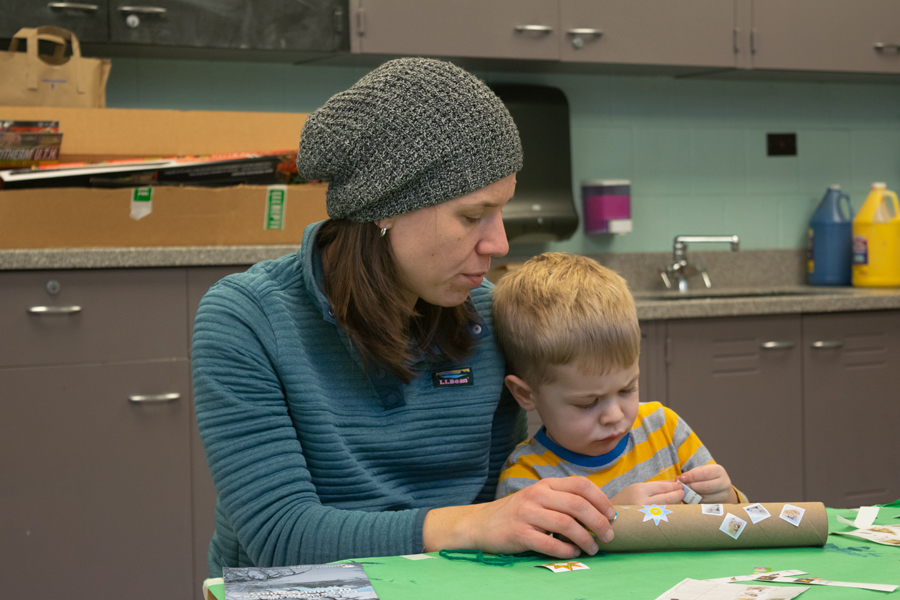Evanston Ecology Center teaches generations about environment
Molly Lubbers/The Daily Northwestern
During the first lesson of “Saplings and Oaks” at the Evanston Ecology Center, Tommy Blomquist decorates his paper towel telescope as his mother, Annie Sutula, holds it stable. The EEC educates the community on the environment year-round.
January 26, 2020
Outside, the wind whips trees and snow coats the ground. But the Evanston Ecology Center has brought nature inside, with lizards and turtles and bunnies — oh my! — among the many animals in its classroom. Here, three- and four-year-old students learn about animals’ winter habitats before having the option to see real-life examples during their first lesson of the “Saplings and Oaks” series.
In sunshine or snow, the center offers programs for children and adults to learn about nature. Dedicated in 1974, the center has taught Evanston residents about the environment for more than 45 years, supported by the Evanston Environmental Association.
“You can’t avoid the environment; it’s there,” EEA president Dick Peach said. “We’re trying to teach people how to interact with it properly, how to be good stewards of the environment.”
Some of the ecology center’s programs include visits to schools, class series and summer camps. Program coordinator Matt Poole said the center tailors its classes to the age group and season but maintains a focus on learning within nature, as long as the weather permits it.
“We’re outside as much as we possibly can be,” he said. “Anything we can’t do outside, we do inside the classroom, with a variety of crafts, games, experiments, stuff like that.”
When the temperature is too low to go outside, the classroom offers a separate learning space. The center renovated it in 2016 after the EEA donated $43,000, closing the gap in funds needed by the city, Peach said.
In 2012, City Council approved a resolution for the EEA and the city to create a plan to make the center financially self-reliant. Peach said the EEA agreed to raise money to cover “exceptional costs,” and half of “capital” costs, which are one-time costs like a new roof or furnace. He also said each spring, they ask center employees for a “wishlist” of items to buy, which they typically will agree to in full.
The EEA has a long history of being the ecology center’s non-profit partner, forming two years after the center’s creation in the ’70s. Since then, the EEA has helped build a greenhouse, install an apiary and expand programming.
Peach said the EEA is an “organization that does so much” without too many people knowing about it. Entirely volunteer-run, he added that it has worked quietly, without seeking fanfare.
More than four decades later, program instructor Rachel Berry said environmental education is important because many kids have lost a connection to nature in today’s society.
“I know that even when I was younger, I had recess out in a concrete courtyard,” Berry said. “A lot of kids don’t really have the opportunity to get out and play and learn about what there is even here in Evanston, in their backyards in a suburban community.”
She added that beginning environmental education young makes children more comfortable with interacting with nature.
As for adults, the ecology center provides community gardens, home brewing classes and other activities, according to Peach and Poole.
Peach said he hopes they have educated at least “four generations of Evanstonians” about the importance of proper environmental use.
“I hope our legacy is that we’ve accomplished that, and through the work of the Ecology Center and the EEA’s help in getting what they need to teach the classes and to build the right classroom environments, that we’re able to achieve that with the generations as we move along,” he said. “I couldn’t ask for a better legacy than that.”
Email: [email protected]


